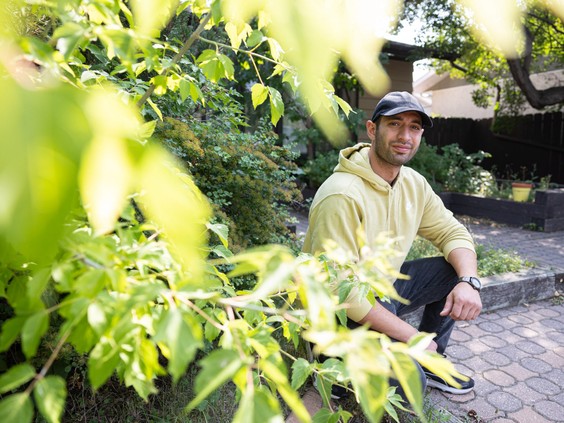
Julia Peterson
Saskatoon StarPhoenix
Ali Kharsa was 13 years old when he started writing his own rap music.
Inspired by “old-school rappers” like Tupac and Eminem, the teenager put down lyrics and beats about fleeing the war in Syria and becoming a refugee with his family, performing for other refugees in the Australian detention centre where he and his dad were held.
Eventually, Kharsa’s mother was able to sponsor him to join her in Canada. As the family established themselves in Saskatoon, Kharsa’s hard-earned love of music and storytelling inspired him to join the local performing arts scene. He has been a fixture on stage and behind the scenes ever since.
After nearly a decade in Saskatchewan, Kharsa is bringing together a group of local Syrian-Canadian artists to showcase their culture and shine a spotlight on a vibrant community.
“Art represents us, as Syrians,” Kharsa said. “Art always tells you and shows you the good side of a community; for us, as a Syrian community, art shows our joy. Our music and art brings happiness and joy to other people, too.
“And maybe this will motivate other Syrian artists in Saskatchewan to be more active and create more art.”
Kharsa has already connected with a wealth of Syrian artists in Saskatoon, including painters, poets and traditional musicians. In the future, he also hopes to work with Syrian dancers, if he can find someone who knows the dances well enough to teach them.
One artist, Ahmed Tuqani, was a fine art teacher in Syria before he came to Saskatoon about eight years ago.
Today, his canvasses blend Syrian styles with a Canadian vantage point.
“Most of the subject of my painting now is the Saskatchewan landscape,” he said. “I use Syrian techniques to make my paintings, and I try to mix together my culture and my new life in SaskatchewanFor Tuqani, working with Kharsa is a chance to find more artists drawing from a similar inspiration.
“It is very important for me to find more people who are working in film or in painting or fine art,” he said. “I want to connect, and this is an opportunity.”
According to Statistics Canada, when the Syrian civil war began in 2011, only 450 people in Saskatchewan identified their ethnic origin as Syrian. By the end of 2016, more than 1,200 Syrian refugees had come to Saskatchewan.
“We are not a big community — we are a minority — but still, we are here,” Kharsa said. “There are some Syrians that have been here for more than 10 years. Some Syrians were born here.
“Sharing our art and our music is something to do for our community. We have to do this so the youngsters and the older teenagers can see their background and know their culture and be proud as a Syrian.”
For Ramia Al Salloum, poetry has always been a way to lift up her love and pride for Syria, to revel in the beauty and history of the Arabic language and share it in translation.
“When I read my poems, I would like people to forget about the war and forget about what happened, and focus more on the landscape and the beauty of the land,” she said.
“I want people to know about our dances and our culture and our civilization and the buildings that we have that are so many thousands of years old. I want people to know that Syrian people are very hospitable and generous, and Syria has one of the oldest civilizations in the world.
“I am trying to change the mindset and stereotypes and the way people think about Syria as a country. I would love for my words and rhymes and rhythms to remind people that Syria is not all about the war. It is much more.”
Along with inspiring young Syrians in Canada to be proud of their heritage and all the places they now call home, Kharsa also sees art as an opportunity to ‘reintroduce’ Syrians to the rest of the province and the country.
“When we tell these stories, I think it inspires people to learn about us as a Syrian community living beside our Canadian neighbours here,” Kharsa said. “Syrians have been in Saskatoon for a long time now, and people in Saskatoon are really friendly with us. But sometimes, people have one picture in their head, and it is hard for me to change it.”
Sometimes, Kharsa says, people still assume that Syrians like him “just arrived today” or are “refugees who don’t know anything and we’re only here to take money from welfare,” when the small community is now thriving and deeply rooted in Canada.
“I have been here for nine years. I really feel Canadian, too,” said Kharsa. “I’m working, I’m paying taxes, I’m living in this country and having the same life as any other Canadian.
“Syrians are striving, trying hard to be successful with our lives and build homes and learn about our neighbours and make friends. We are nice people. And because a lot of us are talented, and we love art and music, I want people to have this picture of us — when people see us as things we’re not, I want to change that view.

